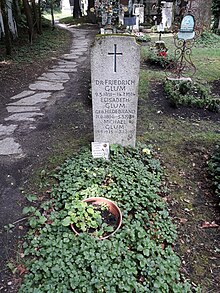Friedrich Glum
Friedrich Glum (born May 9, 1891 in Hamburg , † July 14, 1974 in Munich ) was General Director of the Kaiser Wilhelm Society from 1922 to 1937 .
Live and act
Friedrich Glum came from a Protestant family of doctors from the Rhineland. After attending the Ludwig-Georgs-Gymnasium in Darmstadt , he studied law and economics in Munich, Kiel, Berlin and Bonn from 1911. In 1916 he passed his first legal exam in Kassel . He then began his trainee training at the district court of Eitorf an der Sieg until he was drafted as a soldier.
He completed his doctorate in Tübingen in 1920. The habilitation followed in 1923 in Berlin. In 1930 Glum was appointed adjunct professor for constitutional and administrative law at Berlin University, after having previously taught as a private lecturer in Bonn.
In 1920 Glum joined the municipal department of the Prussian Ministry of the Interior. Also in 1920 he became part-time General Secretary of the Kaiser Wilhelm Society . From 1922 Glum exercised this activity, now under the title of director of the Kaiser Wilhelm Society, full-time. In 1923 he received the title of Executive Member of the Administrative Committee. In the Kaiser Wilhelm Society he was a member of the Senate from 1930 to 1937.
Glum was a member of the German National People's Party (DNVP) from 1931 to 1933 . In 1937 he was forced to resign from his offices in the Kaiser Wilhelm Society after attacks by National Socialist newspapers.
After that, Glum tried in vain to find a job in the banking industry despite the support of Gustav Krupp von Bohlen and Halbach . Instead, he managed to get by as an independent finance and real estate agent until he found a job as an unskilled worker in the legal department of the Nitrogen Syndicate in October 1943.
From 1946 to 1952 Glum worked as a ministerial director in the Bavarian State Chancellery . In this function he played an important - mostly slowing - role in the development of the German Research University and in the conclusion of the state agreement on the establishment of a German research university in Berlin-Dahlem and the financing of German research institutes , which was signed on June 3, 1947 between the states of Bavaria and Württemberg -Baden and Hessen was completed. Up until the beginning of 1948, his direct opponent was the educational reformer Fritz Karsen , who worked for OMGUS , but who often also knew how to negotiate compromises with Glum and thus undermine Glum's policy of blocking.
He converted to Catholicism and became a member of the Christian Social Union (CSU). He finally withdrew from the Kaiser Wilhelm Society in 1950 after losing to Ernst Telschow in the struggle for leadership of the general administration .
Fonts (selection)
- Ten years of the Kaiser Wilhelm Society for the Advancement of Science. , in: Die Naturwissenschaften Heft 18, 1921, pages 293-300.
- Self-government of the economy. A study under public law , Berlin: Sack 1924.
- The German and French Reich Economic Councils , 1929.
- Secret Germany. The aristocracy of democracy , 1930.
- Philosophers in the mirror and distorting mirror , 1954.
- Jean Jacques Rousseau, Religion and State , 1956.
- The escalator , 1960.
- In the shadow of the demon. Romanesque view of Germany from the years 1933-1945. Munich: Günter Olzog, 1962.
- National Socialism , 1962.
- Between science, business and politics. Experienced and imagined in four realms , 1964.
- The parliamentary system of government in Germany, Great Britain and France , 1965.
- The constitutional structure of the Federal Republic of Germany , 1965.
- Conservatism in the 19th Century , 1969.
literature
- Bernhard vom Brocke : Friedrich Glum (1891-1974) , in: Kurt A. Jeserich / Helmut Neuhaus (Hrsg.): Personalities of the Administration: Biographies on German Administrative History 1648-1945 , Kohlhammer 1991, ISBN 978-3-17-010718- 2 , pp. 449-454.
- Michael Grüttner : Biographical Lexicon for National Socialist Science Policy , Heidelberg 2004, p. 61, ISBN 3-935025-68-8 .
Web links
- Literature by and about Friedrich Glum in the catalog of the German National Library
| personal data | |
|---|---|
| SURNAME | Glum, Friedrich |
| BRIEF DESCRIPTION | Director General of the Kaiser Wilhelm Society |
| DATE OF BIRTH | May 9, 1891 |
| PLACE OF BIRTH | Hamburg |
| DATE OF DEATH | July 14, 1974 |
| Place of death | Munich |
